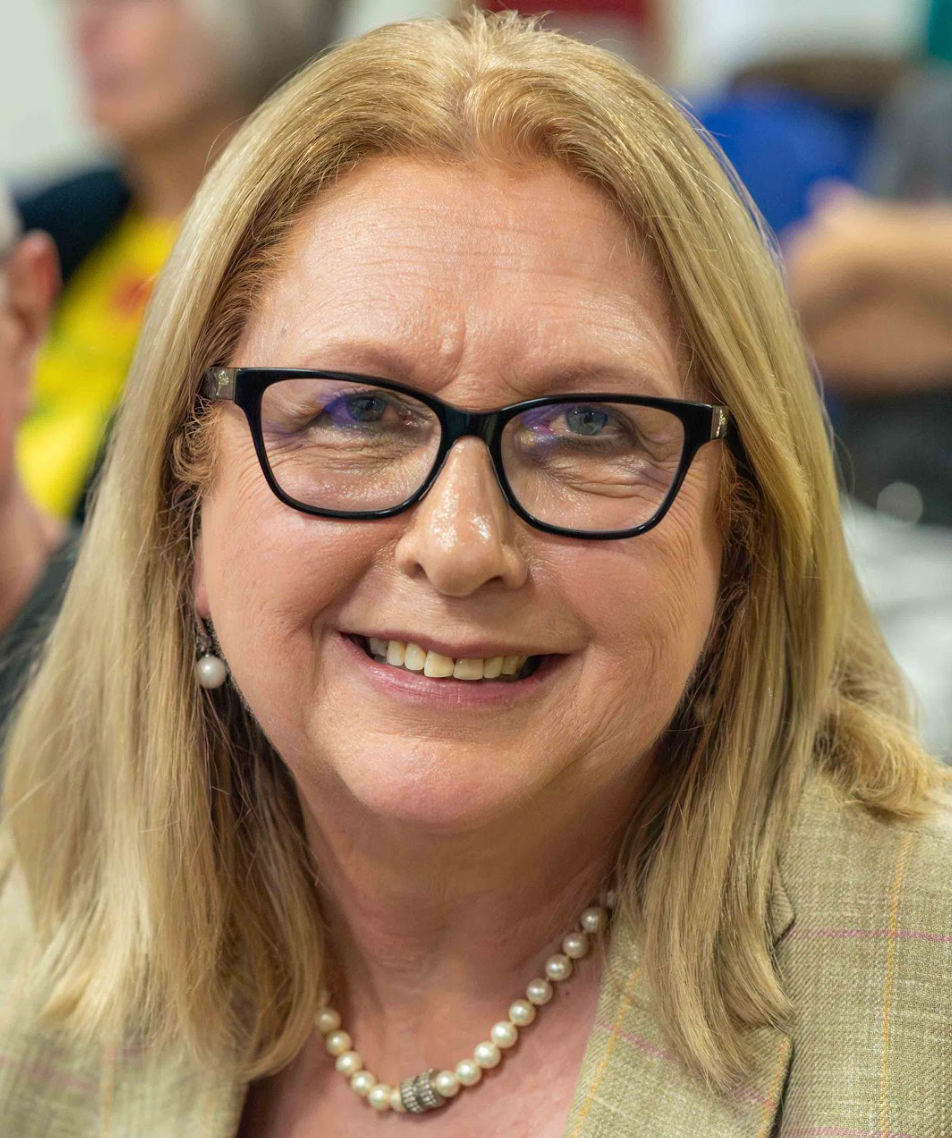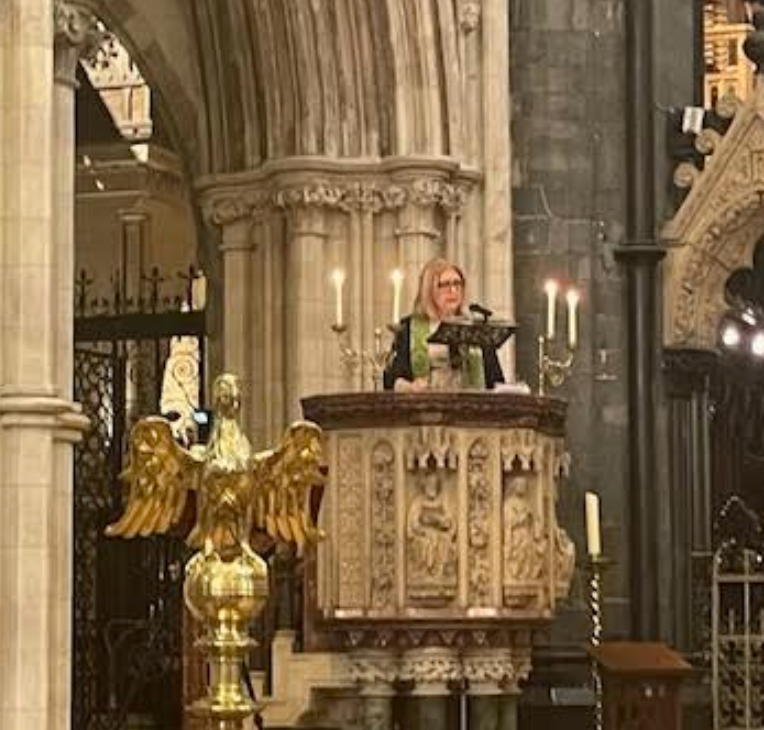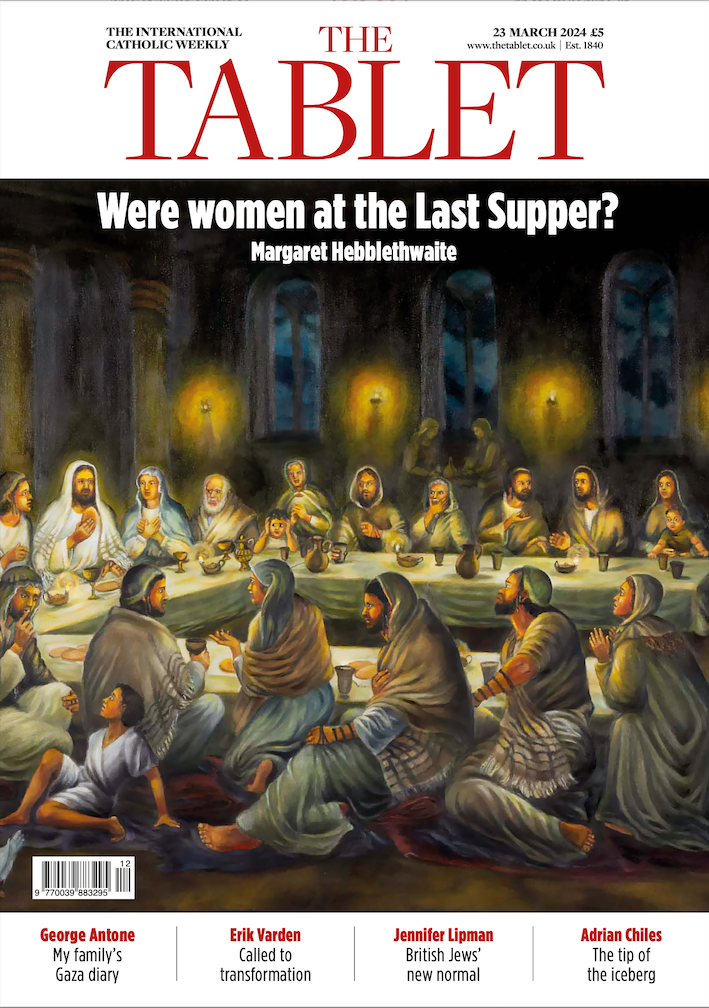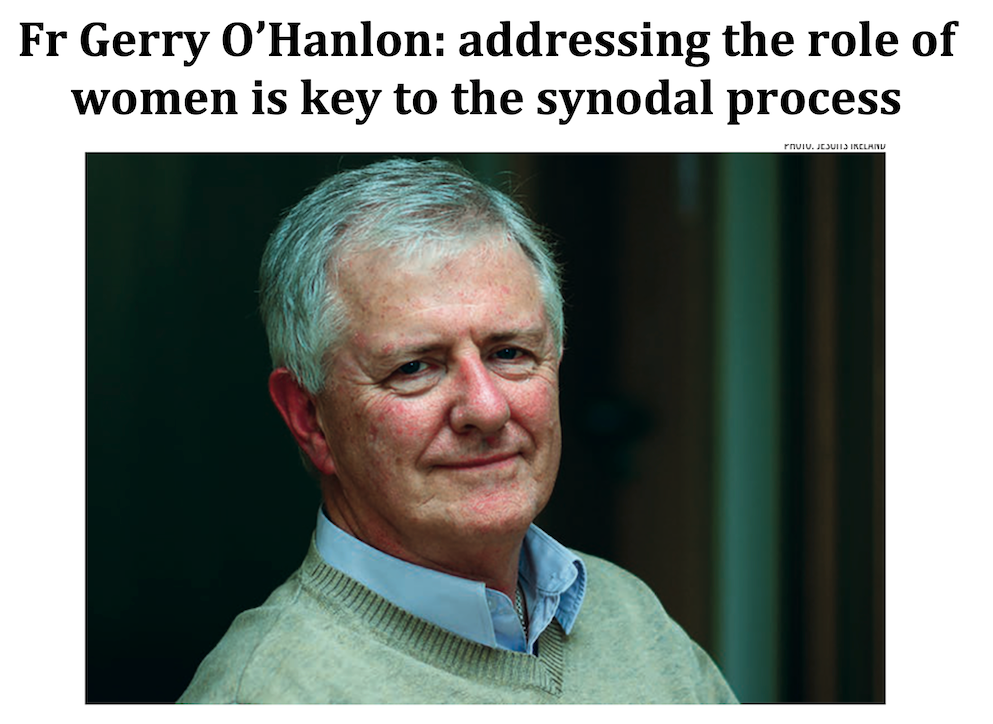Blog Layout
Ursula Halligan: Popes words on homosexuality must find form in a papal document
Ursula Halligan • 28 October 2020
None of us ever imagined pope’s profound shift to endorse same-sex unions
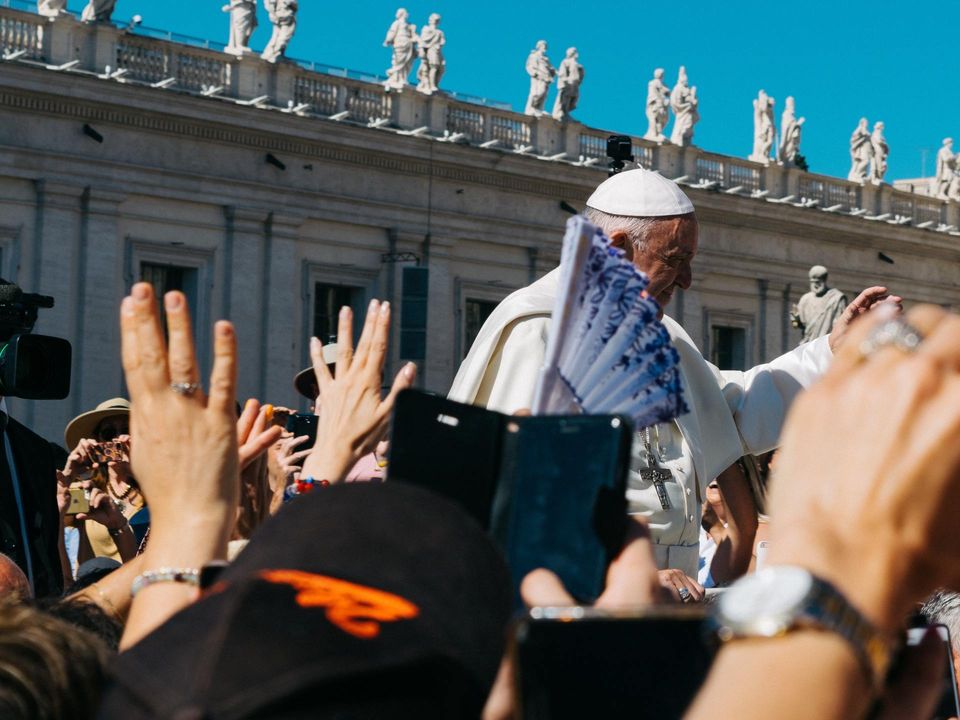
Pope Francis: “Homosexual people have the right to be in a family. They are children of God.” Photograph: Alberto Pizzoli/AFP
They may be incomplete, and they may not, within his lifetime, lead to measurable change within the Catholic Church, but, nonetheless, Pope Francis’s comments endorsing civil unions for gay people represent a profound shift in the church’s position on homosexuality, made by one of the most influential men in the world.
In a sense, the need to belong is one of the most powerful factors motivating people to join a religion, or stay in the faith they inherited from their fathers and mothers. It is a fundamental need unmet for generations of LGBTI+ people.
We haven’t just been left outside, denied genuine involvement in the family. We have been present, but enjoined to silence about the reality of our lives.
Not since the early days of our faith had ordinary people moved so decisively away from, and in advance of, hierarchical thinking
When, coming out in 2015, I wrote a piece for this paper in advance of the marriage equality referendum, I did so fearfully, knowing my Catholic family could not have failed to hear the Catholic catechism’s description of homosexuals as “objectively disordered” and their love “intrinsically evil”.
I was so grateful when the Irish people overwhelmingly voted in favour of the referendum. The sense of truly belonging in the wider family that is Ireland was profound and, for the moment, it was enough. It carried life-changing significance for individuals, heart-opening possibilities for families and a culture-transformative direction for our nation.
What most of us may have underestimated, dazed as we were by the marvellous decision made by so many of us, was that the faithful, for perhaps the first time in 18 centuries of church history, were showing leadership to the hierarchy. Not since the early days of our faith had ordinary people moved so decisively away from, and in advance of, hierarchical thinking.
The referendum could not have been passed were it not for the votes of believers, many of whom probably knew their own courage but perhaps underestimated their own impact. None of us, on that sunny day when joy was unconfined in the quadrangle at Dublin Castle, could ever have imagined a pope endorsing same-sex unions in the way Pope Francis has done this week, saying “homosexual people have the right to be in a family. They are children of God.”
‘Intrinsic evil’
Nobody could have imagined it because the church gave every indication of affirming at every available point its doctrinal view of “homosexuality” as an intrinsic evil.
Two years ago when the World Meeting of Families was held in the RDS Dublin, I stood outside the gates with a rainbow choir, specially assembled for the occasion, to protest at the exclusion of LGBTI families from the event. Those organising the global meeting had been provided with many opportunities to include us.
There is absolutely no ambiguity. None, not a smidgeon
They ignored us. We were to be as absent as I had been from the family of the church for three-quarters of my life. Right down to not having a stand explaining our role within the church. Hear no intrinsic evil, see no intrinsic evil . . .
It was infinitely painful to me as a believer, as a committed Catholic, to be excluded, as were all LGBTI+ Catholic families excluded, from an occasion that purported to celebrate all that is good about family.
The rainbow choir gathered and we sang and some of us wept. We wept at the caricature that continued to be presented by the powers that be within the church, when the faithful, it seemed to us, had long moved beyond that caricature.
Outdated church view
Now, it would appear that one man at the top of all of that prejudice, all of that discrimination, all of that stereotyping and contempt and condemnation, is prepared to reject the extension into civil society of that outdated church view. (Indeed, it would seem he was prepared to reject it more than a year ago as the comments are reported to come from an interview recorded last year.)
By taking such a stand, Pope Frances is emphatically contradicting the position of his predecessor, Pope Benedict, who as Cardinal Joseph Ratzinger, in his capacity as head of the Congregation for the Doctrine of Faith, promoted the view in a 2003 document that the church could never approve of homosexual behaviour or legal recognition for homosexual unions.
This week, Pope Francis did precisely what Ratzinger had sought to prohibit. There is no nuance whatsoever in the pope’s words when he says: “What we have to have is a civil union law; that way they are legally covered.”
Pope Francis has often spoken off the cuff, sometimes carelessly and ambiguously on the subject of homosexuality, raising hopes only for them to be dashed by Vatican retraction. This is different. There is absolutely no ambiguity. None, not a smidgeon. He really has lit a touch-paper that will set off a conflagration in certain resistant quarters in the church.
But documentaries can be dismissed. Handcrafted documents shaping the policy and thinking of the church cannot be so dismissed. We have to hope that the pope, as the supreme legislative authority in the Catholic Church, will follow up his first and welcome challenging of generations of cruel contempt and exclusion with a document that sets out the implications of his comments for Catholic teaching.
Ursula Halligan is a member of We Are Church Ireland
Share
Tweet
Share
Mail
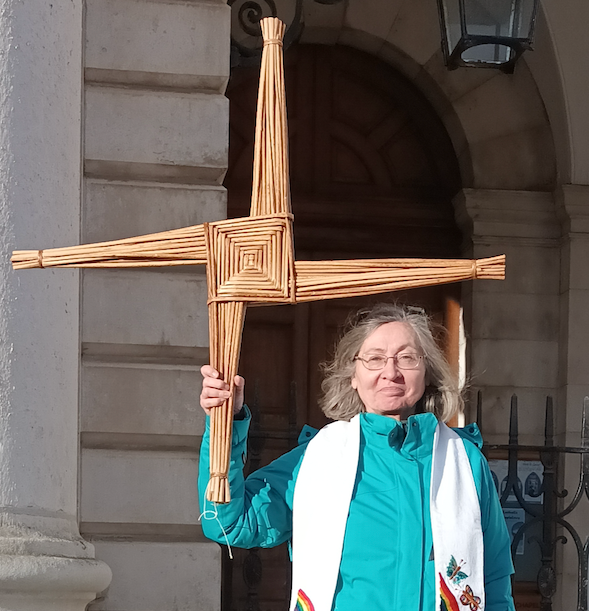
by Soline Humbert
•
25 February 2025
A reflection by Soline Humbert for the Women’s Ordination Conference Retreat “Hidden Springs, Holy Radiance” 9 February 2025 [ see recording on YouTube https://www.youtube.com/watch?v=szP5h1kzEsU ] We have been gathering over the past three days in the presence of Brigid of Kildare, and I am sure she has brought gifts to each one, for my experience is that she is attentive to our needs and very generous with her help. At this stage I just want to share some of my own life journey with Brigid. I first encountered her in 1969 when I came from France to Ireland as a child on holidays to learn English. I went to a small Irish town called Tullow. As it happens it was in Tullow that on the first of February 1807 the order of nuns of St Brigid which had been dissolved at the Reformation, had been refounded by a far-sighted bishop. Symbolically an oak sapling had been brought from Kildare Town, from the church of the oak, to Tullow and planted in the grounds of the Brigidine convent where I took English classes. It was by then a majestic oak tree. It still stands to this day. Coincidentally and somewhat ironically, 1969 was also the year that Pope Paul the 6th removed St Brigid, along with 193 other saints, from the Universal Roman Calendar of saints. The reason being that there wasn’t enough evidence for her existence! That despite the fact she was the most mentioned Irish person in the writings of several centuries after her death... What was true was that her flame had been somehow extinguished, and her importance diminished in a deeply clericalised and patriarchal church as Ireland was at the time. She was in the shadow of St Patrick and very much the secondary patron Saint, reflecting the secondary position of women in general. But change was slowly happening. Having discovered in myself a vocation to the priesthood I eventually co- founded a group for women’s ordination and launched a petition to open all ministries to women in February 1993. At the very same time, which I consider providential, the flame of St Brigid was rekindled by the Brigidine sisters in Kildare Town. Women were stirring after a very long wintertime in the church and in society and becoming more fiery. Brigid with her torch was blazing a way for equality. It is then, and only then, that I came across the story of her ordination as a bishop and I remember my astonishment for I had never read anything like that before, or since, for that matter. Of course, while this fact was mentioned in many of the lives of Brigid going back to the first millennium it had been quietly left out of the pious descriptions of her life which were fed to the people. The way the story is recounted makes it clear that her ordination was considered to be very much the doing of the Holy Spirit. Objections about her gender were voiced but powerless to negate what God had done. It reminds me very much of the passage in the Acts of the Apostles when St Peter is amazed to discover that the Holy Spirit has descended on Cornelius, a gentile, and which leads him to conclude that “God has no favourites”. Brigid’s episcopal ordination at the hands of a bishop overcome by the Spirit is also a powerful affirmation that when it comes to ordination God has no favourite gender. Her ordination’s divine origin shows that Brigid was a bishop because God ordained it, and her. A very subversive truth our Church has yet to learn... As we campaigned for women’s ordination we made sure that this episode from Brigid’s life was brought into the open, again and again, despite clerical efforts to dismiss this dangerous historical memory as pure legend and keep it buried. Interestingly when the Anglican Church of Ireland, (Episcopalian) ordained their first woman bishop in 2013 it was to the diocese of Meath and Kildare! A very symbolic act. I have often gone to St Brigid’s Well in Kildare, a little oasis of peace, to spend some time with Brigid and re-source myself by the gently flowing water. After the First Women’s Ordination Worldwide Dublin international Conference in 2001 I went there again on the anniversary of my baptism and I hung my purple stole on a tree overlooking the well. I had worn that stole for many years as a sign of waiting. From now on I would wear stoles of other colours. And a few years ago, I found myself back in Tullow, as a guest speaker at the invitation of the Brigidine sisters for an international celebration. It was very moving to be able to speak of my calling to priesthood in the place where the order of St Brigid had been revived and where I had first come as a child half a century beforehand! That day I sensed very much the presence of Brigid the bishop and I was filled with joy and gratitude. In some ways we can say St Brigid has risen up and is leading the way for women to rise up. Although a woman in what was very much a man’s world and a man’s church, Brigid exudes a remarkable confidence in her being, in her words and in her actions. No doubt that confidence was rooted in a deeply contemplative life nurtured by prayer. “From the moment I first knew God, I have never let him out of my mind, and I never shall”. She embodies the authority which stems from being filled by the Spirit and a leadership at the service of peace, justice, hospitality to the strangers, charity to the poor and marginalised, reconciliation, healing and harmony with creation and care of the earth. The two Scripture readings we have just heard are very fitting for she was renowned for her practical care and generosity to those in need or suffering. Like Christ, she went around doing good. I must not be the only one who saw and heard in Episcopalian bishop Mariann Budde’s recent words the spirit of St Brigid as she used her God- given authority to plead for mercy for the people in vulnerable situations in the face of unbounded cruelty. Brigid is a bold, dynamic presence. She is said to be a woman of the threshold, of liminal places, and she is a sure guide for our times when we also are in transition on the threshold of a new church and a new world too. She calls to us to step boldly forward with our torches burning brightly, bringing the light and warmth of God’s Love to a world gone cold in the grip of darkness and despair. Her life reminds us that with “God nothing is impossible” and to expect miracles. I shall end on a light- hearted note: I went on pilgrimage to St Brigid’s Well and Solas Bhride in Kildare last Tuesday to prepare for this retreat. On the way back from the well and driving through the wide expanse of the Curragh where thousands of sheep graze freely I started seeing a multitude of rainbows. It reminded me of one of the many whimsical stories about Brigid: Caught in a rainstorm, she hangs her mantle on a sunbeam to dry. Dripping from its edges, colourful rainbows form in the water droplets, and her mantle is ‘bright’ with colour. Lady, from winter’s dark, Star of Imbolc, rise! Dance across our threshold: Scattering warm laughter Seeds of hospitality, Tolerance, forgiveness! Return again to the folk: You the Spring we yearn for! (Tom Hamill)

Women are a problem for the Catholic Church, an institution with ingrained misogyny - Soline Humbert
by Colm Holmes
•
4 November 2024
Papal plámás is no substitute for an end to discrimination against women
About us
We are working to develop inclusive communities based on our 6 Aims, while being open to engage with all sections of the church about our lives in the church today.
Contact Info

by Soline Humbert
•
25 February 2025
A reflection by Soline Humbert for the Women’s Ordination Conference Retreat “Hidden Springs, Holy Radiance” 9 February 2025 [ see recording on YouTube https://www.youtube.com/watch?v=szP5h1kzEsU ] We have been gathering over the past three days in the presence of Brigid of Kildare, and I am sure she has brought gifts to each one, for my experience is that she is attentive to our needs and very generous with her help. At this stage I just want to share some of my own life journey with Brigid. I first encountered her in 1969 when I came from France to Ireland as a child on holidays to learn English. I went to a small Irish town called Tullow. As it happens it was in Tullow that on the first of February 1807 the order of nuns of St Brigid which had been dissolved at the Reformation, had been refounded by a far-sighted bishop. Symbolically an oak sapling had been brought from Kildare Town, from the church of the oak, to Tullow and planted in the grounds of the Brigidine convent where I took English classes. It was by then a majestic oak tree. It still stands to this day. Coincidentally and somewhat ironically, 1969 was also the year that Pope Paul the 6th removed St Brigid, along with 193 other saints, from the Universal Roman Calendar of saints. The reason being that there wasn’t enough evidence for her existence! That despite the fact she was the most mentioned Irish person in the writings of several centuries after her death... What was true was that her flame had been somehow extinguished, and her importance diminished in a deeply clericalised and patriarchal church as Ireland was at the time. She was in the shadow of St Patrick and very much the secondary patron Saint, reflecting the secondary position of women in general. But change was slowly happening. Having discovered in myself a vocation to the priesthood I eventually co- founded a group for women’s ordination and launched a petition to open all ministries to women in February 1993. At the very same time, which I consider providential, the flame of St Brigid was rekindled by the Brigidine sisters in Kildare Town. Women were stirring after a very long wintertime in the church and in society and becoming more fiery. Brigid with her torch was blazing a way for equality. It is then, and only then, that I came across the story of her ordination as a bishop and I remember my astonishment for I had never read anything like that before, or since, for that matter. Of course, while this fact was mentioned in many of the lives of Brigid going back to the first millennium it had been quietly left out of the pious descriptions of her life which were fed to the people. The way the story is recounted makes it clear that her ordination was considered to be very much the doing of the Holy Spirit. Objections about her gender were voiced but powerless to negate what God had done. It reminds me very much of the passage in the Acts of the Apostles when St Peter is amazed to discover that the Holy Spirit has descended on Cornelius, a gentile, and which leads him to conclude that “God has no favourites”. Brigid’s episcopal ordination at the hands of a bishop overcome by the Spirit is also a powerful affirmation that when it comes to ordination God has no favourite gender. Her ordination’s divine origin shows that Brigid was a bishop because God ordained it, and her. A very subversive truth our Church has yet to learn... As we campaigned for women’s ordination we made sure that this episode from Brigid’s life was brought into the open, again and again, despite clerical efforts to dismiss this dangerous historical memory as pure legend and keep it buried. Interestingly when the Anglican Church of Ireland, (Episcopalian) ordained their first woman bishop in 2013 it was to the diocese of Meath and Kildare! A very symbolic act. I have often gone to St Brigid’s Well in Kildare, a little oasis of peace, to spend some time with Brigid and re-source myself by the gently flowing water. After the First Women’s Ordination Worldwide Dublin international Conference in 2001 I went there again on the anniversary of my baptism and I hung my purple stole on a tree overlooking the well. I had worn that stole for many years as a sign of waiting. From now on I would wear stoles of other colours. And a few years ago, I found myself back in Tullow, as a guest speaker at the invitation of the Brigidine sisters for an international celebration. It was very moving to be able to speak of my calling to priesthood in the place where the order of St Brigid had been revived and where I had first come as a child half a century beforehand! That day I sensed very much the presence of Brigid the bishop and I was filled with joy and gratitude. In some ways we can say St Brigid has risen up and is leading the way for women to rise up. Although a woman in what was very much a man’s world and a man’s church, Brigid exudes a remarkable confidence in her being, in her words and in her actions. No doubt that confidence was rooted in a deeply contemplative life nurtured by prayer. “From the moment I first knew God, I have never let him out of my mind, and I never shall”. She embodies the authority which stems from being filled by the Spirit and a leadership at the service of peace, justice, hospitality to the strangers, charity to the poor and marginalised, reconciliation, healing and harmony with creation and care of the earth. The two Scripture readings we have just heard are very fitting for she was renowned for her practical care and generosity to those in need or suffering. Like Christ, she went around doing good. I must not be the only one who saw and heard in Episcopalian bishop Mariann Budde’s recent words the spirit of St Brigid as she used her God- given authority to plead for mercy for the people in vulnerable situations in the face of unbounded cruelty. Brigid is a bold, dynamic presence. She is said to be a woman of the threshold, of liminal places, and she is a sure guide for our times when we also are in transition on the threshold of a new church and a new world too. She calls to us to step boldly forward with our torches burning brightly, bringing the light and warmth of God’s Love to a world gone cold in the grip of darkness and despair. Her life reminds us that with “God nothing is impossible” and to expect miracles. I shall end on a light- hearted note: I went on pilgrimage to St Brigid’s Well and Solas Bhride in Kildare last Tuesday to prepare for this retreat. On the way back from the well and driving through the wide expanse of the Curragh where thousands of sheep graze freely I started seeing a multitude of rainbows. It reminded me of one of the many whimsical stories about Brigid: Caught in a rainstorm, she hangs her mantle on a sunbeam to dry. Dripping from its edges, colourful rainbows form in the water droplets, and her mantle is ‘bright’ with colour. Lady, from winter’s dark, Star of Imbolc, rise! Dance across our threshold: Scattering warm laughter Seeds of hospitality, Tolerance, forgiveness! Return again to the folk: You the Spring we yearn for! (Tom Hamill)

Women are a problem for the Catholic Church, an institution with ingrained misogyny - Soline Humbert
by Colm Holmes
•
4 November 2024
Papal plámás is no substitute for an end to discrimination against women
00353 86 8151054- John
info@wearechurchireland.ie
For merchandise:
We Are Church Ireland
C/O 49 Rockfield Avenue,
Perrystown,
Dublin 12.
D12H6F6
Ireland
We Are Church Ireland
C/O 49 Rockfield Avenue,
Perrystown,
Dublin 12.
D12H6F6
Ireland






